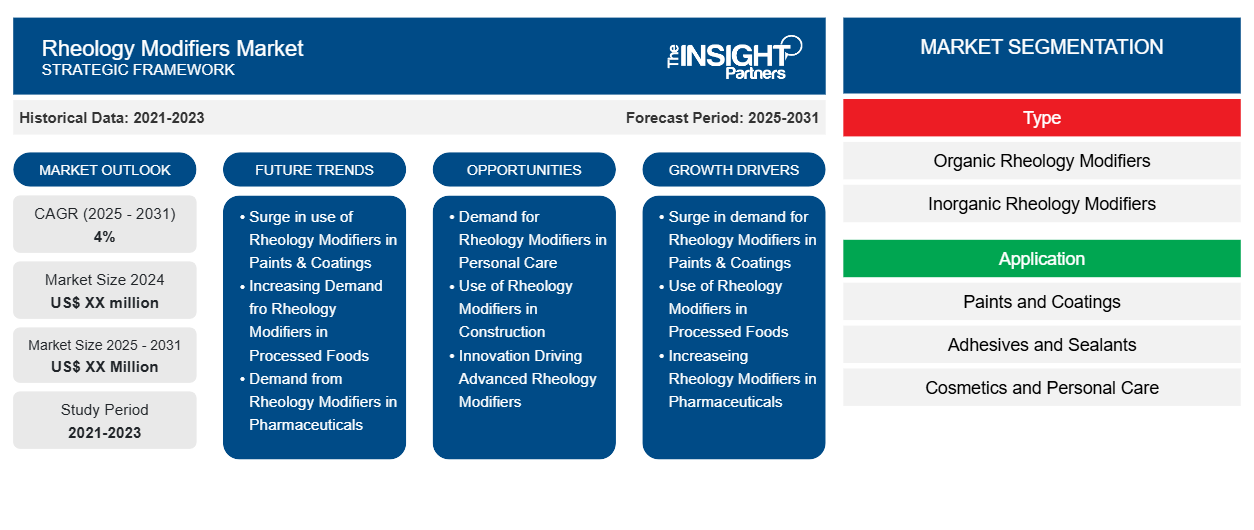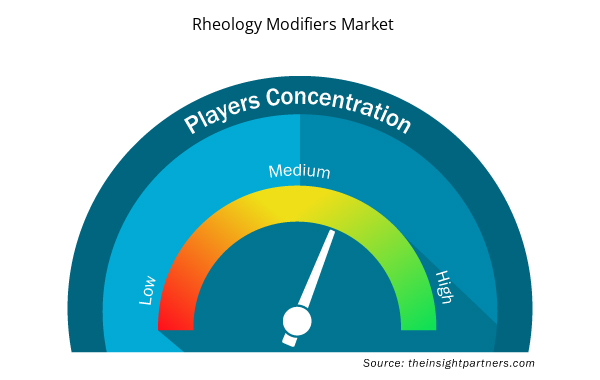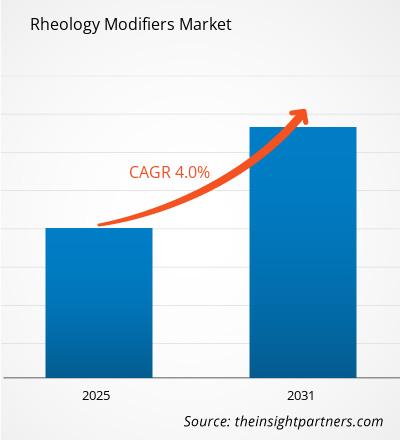The Rheology Modifiers Market is expected to register a CAGR of 4% from 2025 to 2031, with a market size expanding from US$ XX million in 2024 to US$ XX Million by 2031.
Rheology Modifiers Market covers analysis By Type (Organic Rheology Modifiers, Inorganic Rheology Modifiers); Application (Paints and Coatings, Adhesives and Sealants, Cosmetics and Personal Care, Pharmaceuticals, Home Care, Others), and Geography (North America, Europe, Asia Pacific, Middle East and Africa, and South and Central America). Rheology modifiers is an additive or material that alters the rheology of a fluid to which it is added. They are sometimes referred to viscosity modifiers or thickeners. Rheology modifiers provide structure to the fluid formulation and improve the stability of the fluid. There are two types of rheology modifiers namely organic rheology modifiers and inorganic rheology modifiers.
Purpose of the Report
The report Rheology Modifiers Market by The Insight Partners aims to describe the present landscape and future growth, top driving factors, challenges, and opportunities. This will provide insights to various business stakeholders, such as:
- Technology Providers/Manufacturers: To understand the evolving market dynamics and know the potential growth opportunities, enabling them to make informed strategic decisions.
- Investors: To conduct a comprehensive trend analysis regarding the market growth rate, market financial projections, and opportunities that exist across the value chain.
- Regulatory bodies: To regulate policies and police activities in the market with the aim of minimizing abuse, preserving investor trust and confidence, and upholding the integrity and stability of the market.
Rheology Modifiers Market Segmentation
Type
- Organic Rheology Modifiers
- Inorganic Rheology Modifiers
Application
- Paints and Coatings
- Adhesives and Sealants
- Cosmetics and Personal Care
- Pharmaceuticals
- Home Care
- Others
Customize This Report To Suit Your Requirement
You will get customization on any report - free of charge - including parts of this report, or country-level analysis, Excel Data pack, as well as avail great offers and discounts for start-ups & universities
Rheology Modifiers Market: Strategic Insights

- Get Top Key Market Trends of this report.This FREE sample will include data analysis, ranging from market trends to estimates and forecasts.
Rheology Modifiers Market Growth Drivers
- Surge in demand for Rheology Modifiers in Paints & Coatings: The use of rheology modifiers in paints and coatings is very vital in ensuring the right viscosity and stability, along with other applicable properties at the point of application. With growing demand from the automobile, construction, and marine industries, rheology modifiers turn up to be necessary to provide an improved texture and flow property to a product and its consistency in application.
- Use of Rheology Modifiers in Processed Foods: Another important additive in developed processed foods is rheology modifiers that modify texture, consistency, and stability, mostly used in sauces, dressings, and beverages. Increased demand for processed, convenient, and ready-to-eat foods focuses much attention on rheology modifiers to maintain shelf life and quality of the product.
- Increaseing Rheology Modifiers in Pharmaceuticals: Rheology modifiers play an essential role in formulations of pharmaceuticals related to consistency, stability, and the release of drugs like suspensions, creams, and ointments. With the ever-growing demand in emerging markets worldwide in relation to pharmaceutical products, high-performance rheology modifiers are called for urgent support to the processes involved in developing drugs.
Rheology Modifiers Market Future Trends
- Surge in use of Rheology Modifiers in Paints & Coatings: The use of rheology modifiers in paints and coatings is very vital in ensuring the right viscosity and stability, along with other applicable properties at the point of application. With growing demand from the automobile, construction, and marine industries, rheology modifiers turn up to be necessary to provide an improved texture and flow property to a product and its consistency in application.
- Increasing Demand fro Rheology Modifiers in Processed Foods: Another important additive in developed processed foods is rheology modifiers that modify texture, consistency, and stability, mostly used in sauces, dressings, and beverages. Increased demand for processed, convenient, and ready-to-eat foods focuses much attention on rheology modifiers to maintain shelf life and quality of the product.
- Demand from Rheology Modifiers in Pharmaceuticals: Rheology modifiers play an essential role in formulations of pharmaceuticals related to consistency, stability, and the release of drugs like suspensions, creams, and ointments. With the ever-growing demand in emerging markets worldwide in relation to pharmaceutical products, high-performance rheology modifiers are called for urgent support to the processes involved in developing drugs.
Rheology Modifiers Market Opportunities
- Demand for Rheology Modifiers in Personal Care: Rheology modifiers are essential in personal care products, such as shampoos, lotions, and creams. In other words, they regulate texture, stability, and spreadability. Of course, while there is growing demand for beauty, skincare, and cosmetic products around the globe, rheology modifiers represent the foundation on which the sensory appeal of a formulation or product can be enhanced.
- Use of Rheology Modifiers in Construction: Rheology modifiers come with a gamut of construction materials ranging from cement, adhesives, and sealants used in improving workability, flow, and thixotropy. This rapid growth in construction particularly in developing countries tends to raise the demand of rheology modifiers to increase the handling strength of construction material as well as durability.
- Innovation Driving Advanced Rheology Modifiers: Innovation in polymer and material science has helped to develop advanced rheology modifiers with high performance. New generations of modifiers for paints and coatings, food, and pharmaceuticals are now gradually being adopted in order to fine-tune the viscosity and texture of products across a range of industries.
Rheology Modifiers Market Regional Insights
The regional trends and factors influencing the Rheology Modifiers Market throughout the forecast period have been thoroughly explained by the analysts at Insight Partners. This section also discusses Rheology Modifiers Market segments and geography across North America, Europe, Asia Pacific, Middle East and Africa, and South and Central America.

- Get the Regional Specific Data for Rheology Modifiers Market
Rheology Modifiers Market Report Scope
| Report Attribute | Details |
|---|---|
| Market size in 2024 | US$ XX million |
| Market Size by 2031 | US$ XX Million |
| Global CAGR (2025 - 2031) | 4% |
| Historical Data | 2021-2023 |
| Forecast period | 2025-2031 |
| Segments Covered |
By Type
|
| Regions and Countries Covered | North America
|
| Market leaders and key company profiles |
Rheology Modifiers Market Players Density: Understanding Its Impact on Business Dynamics
The Rheology Modifiers Market market is growing rapidly, driven by increasing end-user demand due to factors such as evolving consumer preferences, technological advancements, and greater awareness of the product's benefits. As demand rises, businesses are expanding their offerings, innovating to meet consumer needs, and capitalizing on emerging trends, which further fuels market growth.
Market players density refers to the distribution of firms or companies operating within a particular market or industry. It indicates how many competitors (market players) are present in a given market space relative to its size or total market value.
Major Companies operating in the Rheology Modifiers Market are:
- Dow
- BASF SE
- Lubrizol Corporation
- Arkema
- Clariant
Disclaimer: The companies listed above are not ranked in any particular order.

- Get the Rheology Modifiers Market top key players overview
Key Selling Points
- Comprehensive Coverage: The report comprehensively covers the analysis of products, services, types, and end users of the Rheology Modifiers Market, providing a holistic landscape.
- Expert Analysis: The report is compiled based on the in-depth understanding of industry experts and analysts.
- Up-to-date Information: The report assures business relevance due to its coverage of recent information and data trends.
- Customization Options: This report can be customized to cater to specific client requirements and suit the business strategies aptly.
The research report on the Rheology Modifiers Market can, therefore, help spearhead the trail of decoding and understanding the industry scenario and growth prospects. Although there can be a few valid concerns, the overall benefits of this report tend to outweigh the disadvantages.
- Historical Analysis (2 Years), Base Year, Forecast (7 Years) with CAGR
- PEST and SWOT Analysis
- Market Size Value / Volume - Global, Regional, Country
- Industry and Competitive Landscape
- Excel Dataset


- Wind Turbine Composites Market
- Non-Emergency Medical Transportation Market
- Playout Solutions Market
- Authentication and Brand Protection Market
- Hair Wig Market
- Sleep Apnea Diagnostics Market
- Electronic Toll Collection System Market
- Analog-to-Digital Converter Market
- Real-Time Location Systems Market
- Skin Graft Market

Report Coverage
Revenue forecast, Company Analysis, Industry landscape, Growth factors, and Trends

Segment Covered
This text is related
to segments covered.

Regional Scope
North America, Europe, Asia Pacific, Middle East & Africa, South & Central America

Country Scope
This text is related
to country scope.
Frequently Asked Questions
Growing demand for eco-friendly products is an emerging trend in the market.
The North America market is expected to account for the highest CAGR during the forecast period owing to the growing demand from paints and coatings in the region.
The paints and coatings application segment accounted for the largest market share in 2023
Increasing demand from paint and coatings is a key driver in the market
Dow, BASF SE, Lubrizol Corporation, Arkema, Clariant, Croda International Plc., Ashland, Akzo Nobel N.V., and Elementis Plc are some of the key players in the market.
The Rheology Modifiers Market is estimated to witness a CAGR of 4% from 2023 to 2031
Trends and growth analysis reports related to Chemicals and Materials : READ MORE..
1. Dow
2. BASF SE
3. Lubrizol Corporation
4. Arkema
5. Clariant
6. Croda International Plc.
7. Ashland
8. Akzo Nobel N.V.
9. Elementis Plc.
10. BYK Additives and Instruments

 Get Free Sample For
Get Free Sample For